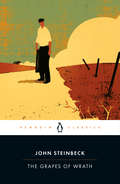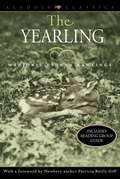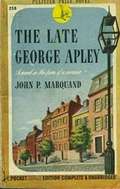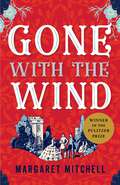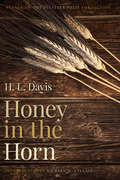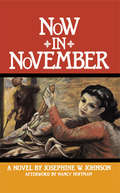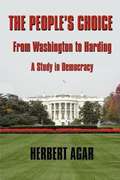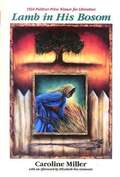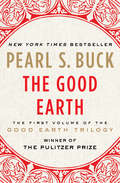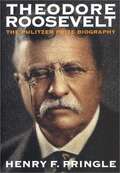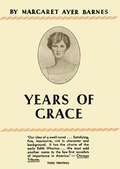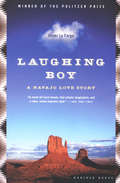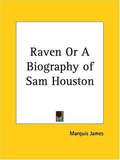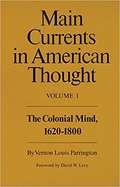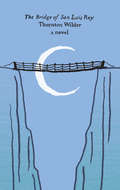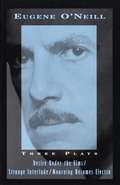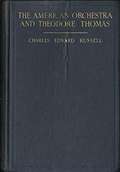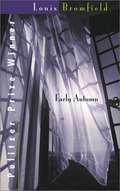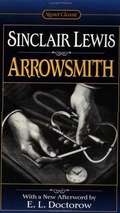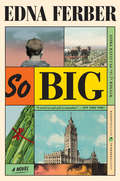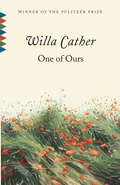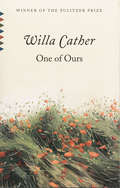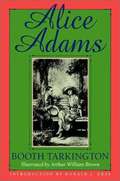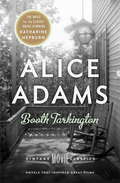Special Collections
Pulitzer Prize Award Winners
Description: Bookshare is pleased to offer the following titles, winners of the Pulitzer Prize Award. Note: Some drama winners are available and are listed under Fiction awards. #award
- Table View
- List View
The Grapes of Wrath
by John Steinbeck and Robert DemottThe Pulitzer Prize-winning epic of the Great Depression, a book that galvanized--and sometimes outraged--millions of readers.
First published in 1939, Steinbeck's Pulitzer Prize-winning epic of the Great Depression chronicles the Dust Bowl migration of the 1930s and tells the story of one Oklahoma farm family, the Joads-driven from their homestead and forced to travel west to the promised land of California. Out of their trials and their repeated collisions against the hard realities of an America divided into Haves and Have-Nots evolves a drama that is intensely human yet majestic in its scale and moral vision, elemental yet plainspoken, tragic but ultimately stirring in its human dignity.
A portrait of the conflict between the powerful and the powerless, of one man's fierce reaction to injustice, and of one woman's stoical strength, the novel captures the horrors of the Great Depression and probes into the very nature of equality and justice in America.
The Grapes of Wrath summed up its era in the way that Uncle Tom's Cabin summed up the years of slavery before the Civil War. Sensitive to fascist and communist criticism, Steinbeck insisted that "The Battle Hymn of the Republic" be printed in its entirety in the first edition of the book--which takes its title from the first verse: "He is trampling out the vintage where the grapes of wrath are stored." At once a naturalistic epic, captivity narrative, road novel, and transcendental gospel, Steinbeck's powerful landmark novel is perhaps the most American of American Classics.
This edition contains an introduction and notes by Steinbeck scholar Robert Demott.
The Yearling
by Marjorie Kinnan RawlingsNo novel better epitomizes the love between a child and a pet than The Yearling. Young Jody adopts an orphaned fawn he calls Flag and makes it a part of his family and his best friend. But life in the Florida backwoods is harsh, and so, as his family fights off wolves, bears, and even alligators, and faces failure in their tenuous subsistence farming, Jody must finally part with his dear animal friend. There has been a film and even a musical based on this moving story, a fine work of great American literature.
Pulitzer Prize Winner
The Late George Apley
by John P. MarquandSweeping us into the inner sanctum of Boston society, into the Beacon Hill town houses and exclusive private clubs where only the city's wealthiest and most powerful congregate, this novel gives us-through the story of one family and its patriarch, the recently deceased George Apley-the portrait of an entire society in transition.
Pulitzer Prize Winner
Gone with the Wind
by Margaret MitchellSince its original publication in 1936, Gone With the Wind—winner of the Pulitzer Prize and one of the bestselling novels of all time—has been heralded by readers everywhere as The Great American Novel.Widely considered The Great American Novel, and often remembered for its epic film version, Gone With the Wind explores the depth of human passions with an intensity as bold as its setting in the red hills of Georgia. A superb piece of storytelling, it vividly depicts the drama of the Civil War and Reconstruction. This is the tale of Scarlett O’Hara, the spoiled, manipulative daughter of a wealthy plantation owner, who arrives at young womanhood just in time to see the Civil War forever change her way of life. A sweeping story of tangled passion and courage, in the pages of Gone With the Wind, Margaret Mitchell brings to life the unforgettable characters that have captured readers for over seventy years.
Honey in the Horn
by H. L. DavisIn this epic work by award-winning novelist, poet, and essayist H.L. Davis, the virtues of the frontier live again in the lives and characters of Oregon settlers during the homesteading period from 1906-1908.
Winner of the 1936 Pulitzer Prize for fiction.
Now in November
by Josephine W. Johnson and Nancy HoffmanBrilliant, evocative, poetic, savage, this first novel (1934) depicts a white, middle-class urban family that is turned into dirt-poor farmers by the Depression and the great drought of the thirties.
The novel moves through a single year and, at the same time, a decade of years, from the spring arrival of the family at their mortgaged farm to the winter 10 years later, when the ravages of drought, fire, and personal anguish have led to the deaths of two of the five. Like Ethan Frome, the relatively brief, intense story evokes the torment possible among people isolated and driven by strong feelings of love and hate that, unexpressed, lead inevitably to doom. Reviewers in the thirties praised the novel, calling its prose "profoundly moving music," expressing incredulity "that this mature style and this mature point of view are those of a young women in her twenties," comparing the book to "the luminous work of Willa Cather," and, with prescience, suggesting that it "has that rare quality of timelessness which is the mark of first-rate fiction."
Pulitzer Prize Winner
The People's Choice, from Washington to Harding
by Herbert AgarA candid inquiry into the policies & personalities of America's presidents, sweeping away popular misconceptions. A U. S. history as seen from the White House.
Pulitzer Prize Winner
Lamb in His Bosom
by Caroline MillerIn 1934, Caroline Miller's novel LAMB IN HIS BOSOM won the Pulitzer Prize for Literature. It was the first novel by a Georgian to win a Pulitzer, soon followed by Margaret Mitchell's GONE WITH THE WIND in 1937. In fact, LAMB was largely responsible for the discovery of GONE WITH THE WIND; after reading Miller's novel, Macmillan editor Harold S. Latham sought out other southern novels and authors, and found Margaret Mitchell.
Caroline Miller was fascinated by the other Old South-not the romantic inhabitant of GONE WITH THE WIND, but rather the poor people of the south Georgia backwoods, who never owned a slave or planned to fight a war. The story of Cean and Lonzo, a young couple who begin their married lives two decades before the Civil War, LAMB IN HIS BOSOM is a fascinating account of social customs and material realities among settlers of the Georgia frontier. At the same time, LAMB IN HIS BOSOM transcends regional history as Miller's quietly lyrical prose style plays poignant tribute to a woman's life lived close to nature-the nature outside her, and the nature within.
Pulitzer Prize Winner
The Good Earth
by Pearl S. BuckThe Pulitzer Prize–winning, New York Times–bestselling novel about a peasant farmer and his family in early twentieth-century China.The Good Earth is Buck&’s classic story of Wang Lung, a Chinese peasant farmer, and his wife, O-lan, a former slave. With luck and hard work, the couple&’s fortunes improve over the years: They have sons, and save steadily until one day they can afford to buy property in the House of Wang—the very house in which O-lan used to work. But success brings with it a new set of problems. Wang soon finds himself the target of jealousy, and as good harvests come and go, so does the social order. Will Wang&’s family cherish the estate after he&’s gone? And can his material success, the bedrock of his life, guarantee anything about his soul? Winner of the Pulitzer Prize and the William Dean Howells Award, The Good Earth was an Oprah&’s Book Club choice in 2004. A readers&’ favorite for generations, this powerful and beautifully written fable resonates with universal themes of hope and family unity. This ebook features an illustrated biography of Pearl S. Buck including rare images from the author&’s estate.
Theodore Roosevelt
by Henry F. PringleThis is a carefully revised and--perhaps happily--shortened version of a biography first published almost a quarter of a century ago. The author said then, and reiterates now, that Theodore Roosevelt was polygonal. He was a man of many ideas, and few of them lacked brilliance. The book still attempts to tell the whole story of an extraordinarily full life.
Pulitzer Prize Winner
Years of Grace
by Margaret Ayer BarnesYears of Grace is the story of forty years and the changes wrought in two generations. Set in Chicago, the novel focuses on Jane Ward, daughter of a socially prominent family, who grows up in the repressed, pseudo-genteel society of the 1880s and 1890s. In her youth, indeed, throughout her life, Jane is a model of decorum. She refuses to marry a young artist whom she loves, because her parents disapprove. She accepts a family-approved husband because it is expected of her. She avoids an affair later in life because it might disgrace husband and family. Twenty years later, Jane's daughter Cicily encounters the identical decisions, but being a product of the war years, when marriage is fast and divorce easy, Cicily cares little for reputation, and lives her life accordingly. Through it all. Mrs. Barnes maintains a scrupulous neutrality, presenting each life as a reflection of the times, never presuming to judge or moralize. If a change in attitude is apparent between generations, it represents only a portion of the total evolvement of society during the forty year period; and Mrs. Barnes reflects in minute detail, changes in fashion, architecture, and interior decor as well as history and social conditions.
The author's first novel, Years of Grace won the Pulitzer Prize for Literature in 1931.
Laughing Boy
by Oliver La FargeLaughing Boy is a silversmith who grew up with a good family and a life rich with Navajo traditions. When she was still very young, Slim Girl was taken from her Navajo family to be educated in an American school. Years later she tries to return to the life of her people, but finds it difficult without a home or family. At a ceremonial dance in 1915, Laughing Boy and Slim girl meet and fall in love. The two start a beautiful and happy life together, but they encounter many obstacles... some of which they may not be able to overcome.
Pulitzer Prize Winner
The Raven
by Marquis JamesThis work tells the tale of Sam Houston: United States Senator; military hero; protégé of Andrew Jackson and Tennessee's Young Man of Destiny; General and President of the Texas Republic; Ambassador of the Cherokee Nation of Indians and adoptee of the Cherokee people; and as trouble brewed with Mexico, he was chosen commander in chief of the Texan provisional government.
Pulitzer Prize Winner
Main Currents in American Thought
by Vernon Louis ParringtonAnalysis of how our scholarship developed.
Pulitzer Prize Winner
The Bridge of San Luis Rey
by Thornton Wilder"On Friday noon, July the twentieth, 1714, the finest bridge in all Peru broke and precipitated five travelers into the gulf below." With this celebrated sentence, Thornton Wilder begins The Bridge of San Luis Rey, one of the towering achievements in American fiction and a novel read throughout the world.By chance, a monk witnesses the tragedy. Brother Juniper seeks to prove that it was divine intervention rather than chance that led to the deaths of those who perished in the tragedy. His study leads to his own death -- and to the author's timeless investigation into the nature of love and the meaning of the human condition.The Bridge of San Luis Rey is now reissued in this handsome hardcover edition featuring a new foreword by Russell Banks. Tappan Wilder has written an engaging and thought-provoking afterword, which includes unpublished notes for the Pulitzer Prize-winning novel, illuminating photographs, and other remarkable documentary material. Granville Hicks's insightful comment about Wilder suggests an inveterate truth: "As a craftsman he is second to none, and there are few who have looked deeper into the human heart."
Three Plays
by Eugene O'NeillWinner of the Nobel Prize
These three plays exemplify Eugene O'Neil's ability to explore the limits of the human predicament, even as he sounds the depths of his audiences' hearts.
Eugene O'Neill was born on October 16, 1888, in New York City. His father was James O'Neill, the famous dramatic actor; and during his early years O'Neill traveled much with his parents. In 1909 he went on a gold-prospecting expedition to South America; he later shipped as a seaman to Buenos Aires, worked at various occupations in the Argentine, and tended mules on a cattle steamer to South Africa. He returned to New York destitute, then worked briefly as a reporter on a newspaper in New London, Connecticut, at which point an attack of tuberculosis sent him for six months to a sanitarium. This event marked the turning point in his career, and shortly after, at the age of twenty-four, he began his first play. His major works include The Emperor Jones, 1920; The Hairy Ape, 1921; Desire Under the Elms, 1924; The Great God Brown, 1925; Strange Interlude, 1926, 1927; Mourning Becomes Electra, 1929, 1931; Ah, Wilderness, 1933; Days Without End, 1934; A Moon for the Misbegotten, 1945; The Iceman Cometh, 1946; and several plays produced posthumously, including Long Day's Journey into Night, A Touch of the Poet, and Hughie. Eugene O'Neill died in 1953.
Strange Interlude was a Pulitzer Prize winner
The American Orchestra and Theodore Thomas
by Charles Edward RussellThe history of the American orchestra.
Pulitzer Prize Winner
Early Autumn
by Louis BromfieldOlivia exists in a loveless marriage to Anson, the authority on his aristocratic family's history. A well-kept secret discovered by his addled mother and Olivia could uproot the Pentland family tree.
Pulitzer Prize Winner
Arrowsmith
by Sinclair LewisA story of a visionary, a man of great energy and purpose, courage and dedication, who never loses hope, even in the face of personal tragedy. Afterword by E. L. Doctorow.
Pulitzer Prize Winner
So Big
by Edna FerberWinner of the 1924 Pulitzer Prize, So Big is widely regarded as Edna Ferber's crowning achievement. A rollicking panorama of Chicago's high and low life, this stunning novel follows the travails of gambler's daughter Selina Peake DeJong as she struggles to maintain her dignity, her family, and her sanity in the face of monumental challenges.
One of Ours, with some Selected Letters
by Willa CatherWilla Cather's Pulitzer Prize-winning narrative of the making of a young American soldier
Claude Wheeler, the sensitive, aspiring protagonist of this beautifully modulated novel, resembles the youngest son of a peculiarly American fairy tale. His fortune is ready-made for him, but he refuses to settle for it. Alienated from his crass father and pious mother, all but rejected by a wife who reserves her ardor for missionary work, and dissatisfied with farming, Claude is an idealist without an ideal to cling to. It is only when his country enters the First World War that Claude finds what he has been searching for all his life.
In One of Ours Willa Cather explores the destiny of a grandchild of the pioneers, a young Nebraskan whose yearnings impel him toward a frontier bloodier and more distant than the one that vanished before his birth. In doing so, she creates a canny and extraordinarily vital portrait of an American psyche at once skeptical and romantic, restless and heroic.
BONUS: The edition includes an excerpt from The Selected Letters of Willa Cather.
One of Ours
by Willa CatherThe son of a prosperous farmer, Claude Wheeler's future is laid out for him as clear and monotonous as the Nebraska sky--a few semesters at the local Christian college followed by marriage and a lifetime spent worrying about the price of wheat. Many young men would be happy to find themselves in Claude's shoes, but his focus is on the horizon, and on the nagging sense that out there, past the farthest reaches of the Great Plains and beyond the boundaries of convention, his true destiny awaits. When the United States finally enters the war raging in Europe, Claude makes the first, and greatest, decision of his life: He answers the call.
Pulitzer Prize Winner
Alice Adams
by Booth TarkingtonOver the pictures, the vases, the old brown plush rocking-chairs and the stool, over the three gilt chairs, over the new chintz-covered easy chair and the gray velure sofa--over everything everywhere, was the familiar coating of smoke and grime.
Yet here was not fault of housewifery; the curse could not be lifted, as the ingrained smudges permanent on the once white woodwork proved. The grime was perpetually renewed; scrubbing only ground it in. --from the novel This is the story of a middle-class family living in the industrialized "midland country" at the turn of the 20th century. It is against this dingy backdrop that Alice Adams seeks to distinguish herself. She goes to a dance in a used dress, which her mother attempts to renew by changing the lining and adding some lace. She adorns herself not with orchids sent by the florist but with a bouquet of violets she has picked herself. Because her family cannot afford to equip her with the social props or "background" so needed to shine in society, Alice is forced to make do. Ultimately, her ambitions for making a successful marriage must be tempered by the realities of her situation. Alice Adams's resiliency of spirit makes her one of Tarkington's most compelling female characters.
Anna Christie
by Eugene O'NeillEarly in his career, Eugene O'Neill (1888-1953) wrote a series of plays revolving around characters obsessed with the sea. This period culminated in the 1922 production of Anna Christie, a drama of social realism that was among the first of the author's plays to explore characters searching for their own identities. Centering on the reunion of a barge captain and his daughter after a twenty-year separation, the play derives its tension from the former's disaffection for the seafaring life and the latter's love for a sailor. The father-daughter conflict elicits a shocking confession, which illuminates the author's contention that character is fate and the seemingly external forces controlling destiny actually lie within
.Anna Christie amply displays O'Neill's extraordinary insights into character and his masterly use of language, qualities that have earned him acclaim as one of America's greatest playwrights. Students and lovers of modern theater will prize this inexpensive edition of his landmark drama.
Pulitzer Prize Winner
Alice Adams
by Booth TarkingtonThe basis for George Stevens’s major motion picture starring Katharine Hepburn in her Oscar-nominated leading role.
In a small Midwestern town in the wake of World War I, Alice Adams delightedly finds herself being pursued by Arthur Russell, a gentleman of a higher social class in life. Desperate to keep her family's lower-middle-class status a secret, she and her parents concoct various schemes to keep their family afloat. Though the realities of her situation eventually reveal themselves and her relationship with Arthur fizzles, Alice's acceptance of this leads her to seek out work to support her family with an admirable resiliency. An enchanting and authentic tale of a family's aspirations to seek more out of life, Alice Adams reveals the strength of the human spirit and its incredible ability to evolve.
Originally published in 1921, this bestselling Pulitzer Prize-winning novel was adapted into film twice, and its heroine, the sparkling Alice Adams, still resonates with readers today.
With a new foreword by Anne Edwards.
